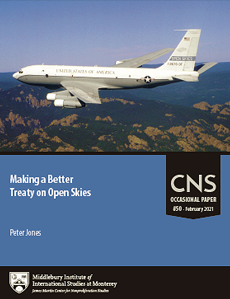February 8, 2021
Peter Jones
 The US withdrawal from the Treaty on Open Skies was motivated by ideological considerations within the Trump Administration. In response, Russia announced its intention to withdraw on January 15, but has not yet notified the depositaries of the treaty to begin the six-month clock. If the treaty is to be sustained, its two main members must reconsider these decisions. This paper proposes ideas as to how the Biden Administration may wish to re-join the treaty, how Russia may be persuaded to stay in it, and also steps that the other treaty members can take to facilitate these objectives. Going further, the paper argues that the treaty, which is now almost 30 years old, could be strengthened in its operations and applied in other contexts. Proposals are advanced in the paper as to how all of this might be done in a phased manner, with basic steps required to sustain the treaty coming first and then more ambitious reforms being considered over time.
The US withdrawal from the Treaty on Open Skies was motivated by ideological considerations within the Trump Administration. In response, Russia announced its intention to withdraw on January 15, but has not yet notified the depositaries of the treaty to begin the six-month clock. If the treaty is to be sustained, its two main members must reconsider these decisions. This paper proposes ideas as to how the Biden Administration may wish to re-join the treaty, how Russia may be persuaded to stay in it, and also steps that the other treaty members can take to facilitate these objectives. Going further, the paper argues that the treaty, which is now almost 30 years old, could be strengthened in its operations and applied in other contexts. Proposals are advanced in the paper as to how all of this might be done in a phased manner, with basic steps required to sustain the treaty coming first and then more ambitious reforms being considered over time.
About the Author
Peter Jones is an Associate Professor in the Graduate School of Public and International Affairs at the University of Ottawa. Prior to joining academe he spent 14 years in the Canadian Public Service. During that time, he served on the Canadian Delegations to the Ottawa, Budapest and Vienna Open Skies Conferences. He is the author of: Jones, P., Open Skies: Confidence-building, Transparency and the End of the Cold War, (Palo Alto: Stanford University Press, 2014). The author wishes to thank Pierce Corden, Jim Goodby, Katrina Kertysova, David Koplow, Diana Marvin, George Perkovich, Andreas Persbo and William Potter for their comments on previous drafts of this paper. The views expressed in the paper are the author’s alone.
